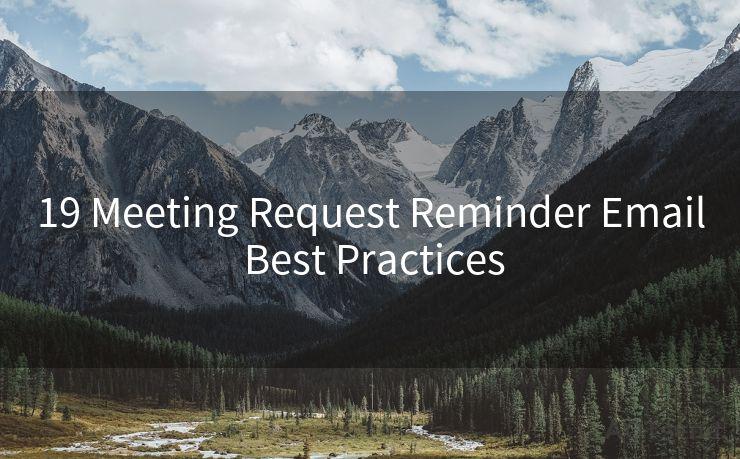19 Meeting Request Reminder Email Best Practices




In the fast-paced business world, meetings are crucial for decision-making, problem-solving, and collaboration. However, with busy schedules and information overload, it's essential to craft effective meeting request reminder emails. Here are 19 best practices to ensure your meeting reminders are clear, professional, and action-oriented.
1. Clear Subject Line
Start with a subject line that clearly states the meeting's purpose, date, and time. This helps recipients quickly understand the email's content and importance.
2. Personalized Greeting
Use a personalized greeting, addressing the recipient by name. This adds a personal touch and grabs their attention.
3. Brief Introduction
Provide a brief introduction, reminding the recipient of the upcoming meeting and its purpose. Keep it short and to the point.
4. Meeting Details
Include all essential meeting details: date, time, location (if applicable), and meeting agenda. Use bullet points or a table for clarity.
5. RSVP Requirement
If attendance confirmation is needed, clearly state the RSVP deadline and instructions.
6. Meeting Link or Dial-in Information
For virtual meetings, provide the necessary links or dial-in information. Test these before sending the email to ensure they work correctly.
7. Agenda Items
List the key agenda items to give recipients a preview of what will be discussed. This helps them prepare for the meeting.
8. Attachments or Supporting Documents
If there are any relevant attachments or supporting documents, include them in the email. Ensure they are clearly labeled and easy to access.
9. Call to Action
End the email with a clear call to action, whether it's to confirm attendance, review documents, or prepare for discussion topics.
10. Professional Tone
Maintain a professional tone throughout the email, avoiding colloquial language or slang.
11. Proofreading
Proofread the email carefully to avoid any grammatical errors or typos that could detract from your message's professionalism.
12. Timely Reminder
Send the reminder at least a day before the meeting to give recipients enough time to prepare.
13. Consider Time Zones
When scheduling meetings with participants from different time zones, ensure the meeting time is converted to their local time.
14. Follow-Up
Consider sending a follow-up email after the meeting, summarizing key points and decisions made.
15. Template Usage
Using a template can save time, but always customize it to fit the specific meeting details.
16. Avoid Excess Information
Stick to the essentials in your email. Too much information can be overwhelming and cause recipients to miss key details.
17. Mobile-Friendly Format
Ensure your email is mobile-friendly, as many people check emails on their phones.
18. Testing
If possible, send a test email to yourself first to check formatting and links.
🔔🔔🔔
【AOTsend Email API】:AOTsend is a Managed Email Service for sending transactional emails. Support Email Types: reminders, authentication, confirmations, notifications, verification codes, invoices, password resets, account activations, billing statements, two-factor authentication (2FA), and one-time passwords (OTP) emails, etc. $0.28 per 1000 Emails. 99% Delivery, 98% Inbox Rate.
You might be interested in:
Why did we start the AOTsend project, Brand Story?
What is a Managed Email API, How it Works?
Best 25+ Email Marketing Platforms (Authority,Keywords&Traffic Comparison)
Best 24+ Email Marketing Service (Price, Pros&Cons Comparison)
Email APIs vs SMTP: How they Works, Any Difference?
19. Feedback Loop
Encourage feedback from recipients on the clarity and usefulness of the meeting reminders. This helps improve future communications.

Incorporating these 19 best practices into your meeting request reminder emails will ensure smooth and effective communication, leading to more productive and focused meetings. Remember, the key is to keep it simple, clear, and professional.




Scan the QR code to access on your mobile device.
Copyright notice: This article is published by AotSend. Reproduction requires attribution.
Article Link:https://www.mailwot.com/p6968.html



